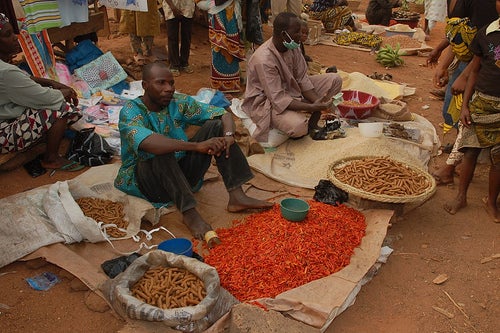
On October 23, Nigeria joined a fast-growing list of countries making headline commitments to financial inclusion targets and actions,by launching a new Financial Inclusion Strategy.
A total of 35 countries have now made commitments through the ‘Maya Declaration’ of the Alliance for Financial Inclusion (a global network of financial regulators), including 19 as recently as September 2012. 17 countries committed in June 2012 to targets, actions, and coordination platforms through the new G20 Financial Inclusion Peer Learning Program. These new commitments and targets could have a significant impact in advancing financial inclusion, if the challenges in meeting them can be overcome.
Are financial inclusion targets and strategies effective?
Evidence on their effectiveness is still emerging. But some examples already indicate that significant improvements can be achieved through shared public and private sector commitments to financial inclusion. For example, the South Africa Financial Sector Charter helped increase the percentage of “banked” adults from 46 to 64 percent in 4 years, with six million ‘Mzansi’ basic bank accounts opened. In the UK, a Financial Inclusion Taskforce successfully halved the number of unbanked adults--through e-money regulation, Government to Person payments linked to bank accounts, and access to financial services through post offices. And the Government of Brazil implemented regulatory reforms that enabled the financial sector to respond with innovative products and expanded access, leading to a dramatic expansion of financial service access points. As a result, every municipality in the country, including in remote rural areas, is now covered.
What’s in a country commitment?
Country commitments to financial inclusion typically include targets for increasing the proportion of the population that has access to bank accounts. They can include objectives to improve access to credit, savings, electronic payments, remittances, and to strengthen consumer protection, financial capability, and financial integrity. Examples of new country commitments made so far in 2012 include:
- Colombia (Ministry of Finance and Public Credit): create long-term financial inclusion strategy and coordination committee for financial inclusion policy; create special licensing for small payment systems (e-money and prepaid cards) for improved competition.
- Democratic Republic of Congo (Banque Centrale du Congo): complete the modernization of the national payment system, improve consumer protection regulations, and introduce mobile banking and banking agents.
- Ghana (Bank of Ghana): achieve 70% financial inclusion by 2017, revise its payment system strategy and develop a financial literacy program by 2012, stimulate uptake of mobile financial services, and report on progress.
- Guatemala (Superintendencia de Bancos): create a code of good practice for consumer protection for all financial service providers, develop transparency and disclosure standards for products and services, measure the impact of commitments, and create a database by 2013
- Indonesia (Bank Indonesia): expand access to finance through new national ID program, improved financial education, no-frills “Tabunganku” savings accounts, and smarter regulation.
- Malaysia (Bank Negara Malaysia): ensure 95% of the adult population has access to financial services by 2014, adopt innovative channels to improve agent and mobile banking, and expand products and services that meet the needs of all citizens, including microfinance and long-term savings.
Nigeria—From Commitment to Financial Inclusion
As I mentioned earlier, Nigeria recently launched a Financial Inclusion Strategy with headline targets. At the launch event on 23 October in Abuja, the Central Bank of Nigeria (CBN) set out targets and commitments to financial inclusion reforms and initiatives. Priority actions set out by the CBN included: (i) a risk-based tiered framework for Know-Your-Customer (KYC) regulation, in order to ease access to financial services for low income customers; (ii) a regulatory framework for agent banking, in order to enable the expansion of financial services delivery; (iii) strengthened financial consumer protection and financial literacy; and iv) the promotion of ‘no frills’ bank accounts for low income customers.
Nigeria’s new Financial Inclusion Strategy has the potential to positively impact many millions, if the following critical elements are put in place: firstly, that ministries and agencies beyond the central bank ‘buy in’ to the strategy and play their part; secondly that the critical regulatory and supervisory reforms, and financial infrastructure, are put in place as a priority; and thirdly that the financial sector responds with investment in delivery channels, innovation in financial services, and the roll out of new business models to better serve the un- and under-banked.
In response to these and other challenges, the World Bank Group provides data, technical assistance, capacity-building, financing and risk-sharing support to countries in achieving their financial inclusion commitments. Currently, we’re working with development partners to structure a Financial Inclusion Support Framework to scale-up support for this wave of country commitments to financial inclusion, and help countries achieve their targets.



Join the Conversation